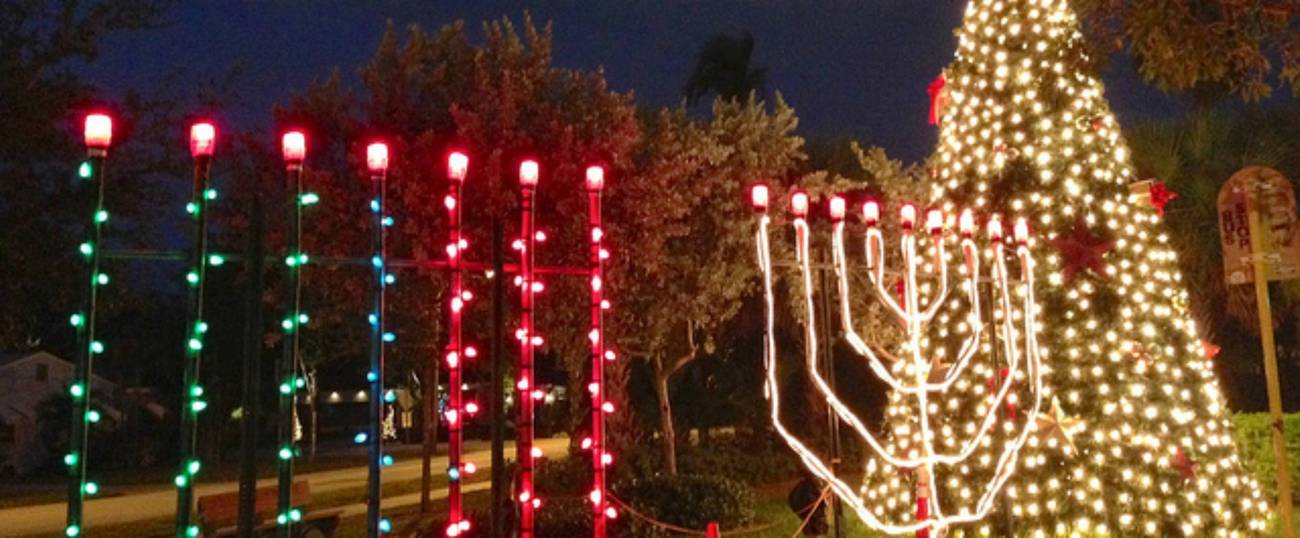Pine Trees, Latkes, and the NBA
‘Hanukkah, Oy, Hanukkah!’




I’ve always wondered at the coincidence (or maybe not) of the fact that the title of the Yiddish song “Hanukkah, Oy, Hanukkah” is reminiscent of the title of the German Christmas song “Tannenbaum, O Tannenbaum” (“Pine Tree, Oh Pine Tree”). Same title structure, same number of syllables, and stress.
The German holiday song was penned in 1824 by Ernst Gebhard Salomon Anschütz, a Leipzig organist and composer; the Yiddish one, by Mordche Rivesman, who lived in Lithuania and was born several decades A.T. (After Tannenbaum).
Was Reb Mordche trying to keep up with the Anschützes? Or is there no relationship between the winter season songs?
I’ll leave it to some Yiddish doctoral student looking for a thesis topic to address that question. Here, we shall focus exclusively on the Jewish holiday song. There are enough goyishe magazines that can tackle the other one.
“Hanukkah, Oy, Hanukkah,” starts the Jewish song, “A yontif a sheyner”–“a holiday, a beautiful one.”
Yontif is a Yiddish corruption of the Hebrew phrase yom tov, or “good day”–“good” here meaning “special.” Sheiner is directly borrowed from the German schön.
“A lustiger a freylekher,” continues the song, “a jolly one, a joyous one.”
Lustig is also German, and is used in contemporary German to mean “funny,” in the sense of “amusing.” Yes, even Germans, contrary to popular assumption, have a word for funny.
The German word for joyous, though, is freudig, not freylich. In modern German, that latter word means “of course.” But it has been suggested that the Yiddish usage harks back to what the word meant once upon a time in German.
“Nisht do noch azeyner.”
“It has no parallel.” Or, literally, “there is here no other like it.” The rhyme employs the Lithuanian pronunciation of “azoiner”. Ot azoi! or Ot azei! means “That’s the way!”–literally, “Like that!”
“Aleh nacht mit dreydlech shpiln mir”–“All the nights with dreidels we play.”
“Frisheh heyseh latkes, esn ohn a shir.”–“Fresh, hot latkes, we eat them endlessly.”
That last word is actually Hebrew in origin. Shiur means “a measure” and so ohn a shir means “without measure or limit.” Another meaning of shiur–and, in Yiddish, shir–is a lecture, based on the fact that they are meant to last a particular measure of time. (The word is unrelated to the Hebrew shir, meaning song. Confusing, yes, I know.)
Next, my favorite word in the song–Geshvinder!
Geshvinder! Tsindt kinder
Di hanukkah lichtlech on!
“Quick! Light the Hanukkah candles, children!”
Geshvinder is from the Old High German swind, related to the English “swift”.
Holger Geschwindner, of course, is the German-born former basketball player and currently an official coach of the Dallas Mavericks. His surname, if descriptive, may have helped him on the court.
And the grand finale repeated twice:
Zogt Al Hanisim; loybt Got far di nisim, Un lomir ale tantsen in kon.
“Say ‘Al Hanisim’ (the paragraph added to the Amidah, or silent prayer, on Hanukkah and Purim), praise God for the miracles. and let’s all dance together in a circle.”
Al Hanisim means “For the miracles,” and so the last stitch rhymes “miracles” with “miracles” – a bit of a cop-out. But with a stomach full of latkes and the tiny flames flickering, really, who cares?
Happy Hanukkah!
Rabbi Shafran, whose latest book is “It’s All In The Angle” (Judaica Press), blogs at rabbiavishafran.com.